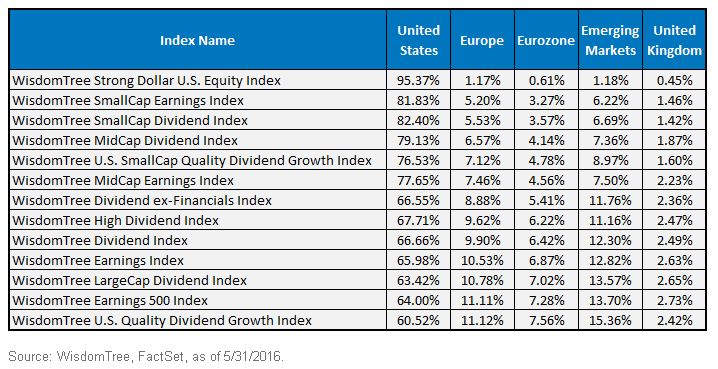How Important Is Europe to U.S. Companies?


 For definitions of Indexes in the chart, visit our glossary.
The market sell-off immediately following Brexit had less to do with a direct impact on slower economic growth or lower revenue/earnings from the United Kingdom or Europe, and more with spikes in risk aversion and negative sentiment surrounding what the Brexit means for the future of the eurozone, particularly many of the European banks. Will there be other European countries leaving EU in the UK’s footsteps? This will remain an open question for some time.
Investors focused on the fundamentals—and WisdomTree’s equity Indexes typically focus on the dividends companies pay or the earnings they generate—provide an income-oriented approach to the markets. Any market sell-offs for U.S. companies likely should be viewed as market noise, given what little direct revenue from the eurozone or the UK is generated across most of corporate America.
For definitions of Indexes in the chart, visit our glossary.
The market sell-off immediately following Brexit had less to do with a direct impact on slower economic growth or lower revenue/earnings from the United Kingdom or Europe, and more with spikes in risk aversion and negative sentiment surrounding what the Brexit means for the future of the eurozone, particularly many of the European banks. Will there be other European countries leaving EU in the UK’s footsteps? This will remain an open question for some time.
Investors focused on the fundamentals—and WisdomTree’s equity Indexes typically focus on the dividends companies pay or the earnings they generate—provide an income-oriented approach to the markets. Any market sell-offs for U.S. companies likely should be viewed as market noise, given what little direct revenue from the eurozone or the UK is generated across most of corporate America.
Important Risks Related to this Article
Dividends are not guaranteed, and a company currently paying dividends may cease paying dividends at any time.

Jeremy Schwartz has served as our Global Chief Investment Officer since November 2021 and leads WisdomTree’s investment strategy team in the construction of WisdomTree’s equity Indexes, quantitative active strategies and multi-asset Model Portfolios. Jeremy joined WisdomTree in May 2005 as a Senior Analyst, adding Deputy Director of Research to his responsibilities in February 2007. He served as Director of Research from October 2008 to October 2018 and as Global Head of Research from November 2018 to November 2021. Before joining WisdomTree, he was a head research assistant for Professor Jeremy Siegel and, in 2022, became his co-author on the sixth edition of the book Stocks for the Long Run. Jeremy is also co-author of the Financial Analysts Journal paper “What Happened to the Original Stocks in the S&P 500?” He received his B.S. in economics from The Wharton School of the University of Pennsylvania and hosts the Wharton Business Radio program Behind the Markets on SiriusXM 132. Jeremy is a member of the CFA Society of Philadelphia.

